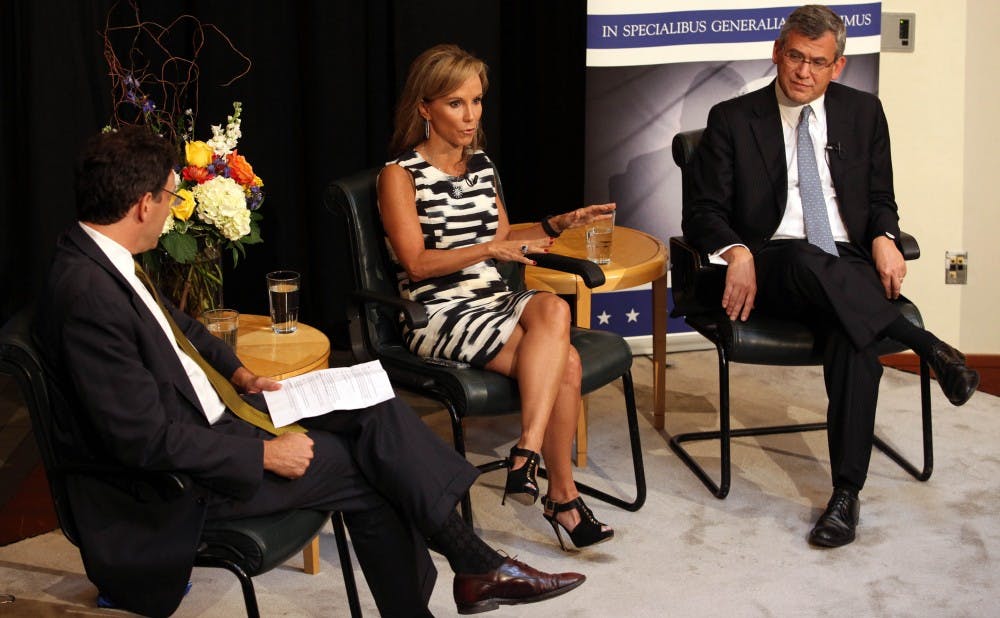Counterterrorism experts Daniel Benjamin and Frances Townsend called for increased antiterrorism measures in the Middle East—without new military commitment—at a talk in the Sanford School of Public Policy Wednesday.
Benjamin and Townsend discussed the terrorist threats facing the U.S. in a packed Fleishmann Commons. The talk addressed foreign policy challenges posed by recent events in Libya, Iraq and Syria—most notably, the emergence of the Islamic State of Iraq and Syria as a serious terrorist threat. Both Benjamin and Townsend called for greater capacity-building efforts in the region’s nations—without new military commitment.
“The American people are tired of deploying troops to Iraq for such a long time,” said Benjamin, Coordinator for Counterterrorism at the State Department from 2009 to 2012. “People have a right to know what it is we’re getting into, and I don’t think it passes the straight face test to say we’re going to fix Iraq, screwed up as it is right now.”
Efforts should instead be directed toward creating an ongoing strategy, Benjamin said, noting that the U.S. was “not well-adapted” to dealing with long-term terrorist threats.
Townsend, former Homeland Security advisor to President George W. Bush, stressed the importance of countering the ISIS threat through economic and ideological means, in addition to military action. She criticized the Bush and Obama administrations for failing to address terrorist propaganda.
“We need a comprehensive approach to dealing with the terrorist narratives,” Townsend said. “I mean, there’s a whole narrative to talk about how bad these people are to their own populations.”
Townsend noted that ISIS had a strong grasp of propaganda value—disseminating images of American journalist James Foley’s beheading to reporters and key media organizations prior to the release of the execution video. The U.S. needed to do the same with regards to using media and other means of communication, she said.
The current administration needs to concentrate on building a strong international coalition, Benjamin said. He noted, however, there were limitations to what U.S. foreign policy could accomplish, citing the failure to establish a democratic government in Iraq.
The 2003 U.S. intervention in Iraq had set the conditions for a democratic government, Townsend said. The country had failed to take advantage of the opportunity, however, due to former Iraqi Prime Minister Nouri al-Maliki’s refusal to compromise with other Islamic factions.
No amount of money, effort or training could have changed the situation in Iraq without the cooperation of the country’s leaders, Benjamin added.
“It is time for the region to take care of its problem,” he said. “It is not time for the U.S. to go back for unlimited deployment.”
Both Benjamin and Townsend praised the drone program, noting that drone strikes had been highly precise and vital in taking out terrorist leadership.
But Benjamin warned against indiscriminate overuse of air strikes in Syria. He noted that it was “critical” the U.S. does not lose Sunni partners in the region.
“There’s going to be a lot of tip-toeing in this region,” he said. “It’s not fun, and it’s not militarily satisfactory, but it is politically necessary.”
Benjamin emphasized the importance of addressing the “hysteria” induced by ISIS’s execution of two American journalists. In spite of its recent threats against the U.S., the organization remains largely contained within the Iraq-Syria region, he said.
“Intelligence reports indicate this is not an imminent threat against the United States,” Benjamin said.
Around 100 people—a mix of students, faculty and local residents—attended the talk, which was generally well-received.
Senior Anjali Sawh praised both speakers for their grasp of the issues addressed but said she wished they had been less cautious.
“I felt they were both a little bit reserved,” she said.
The event was co-sponsored by the Sanford School, Triangle Center on Terrorism and Homeland Security, Duke Program in American Grand Strategy and the Triangle Institute for Security Studies. David Schanzer, associate professor of public policy, moderated the discussion.
Get The Chronicle straight to your inbox
Signup for our weekly newsletter. Cancel at any time.

